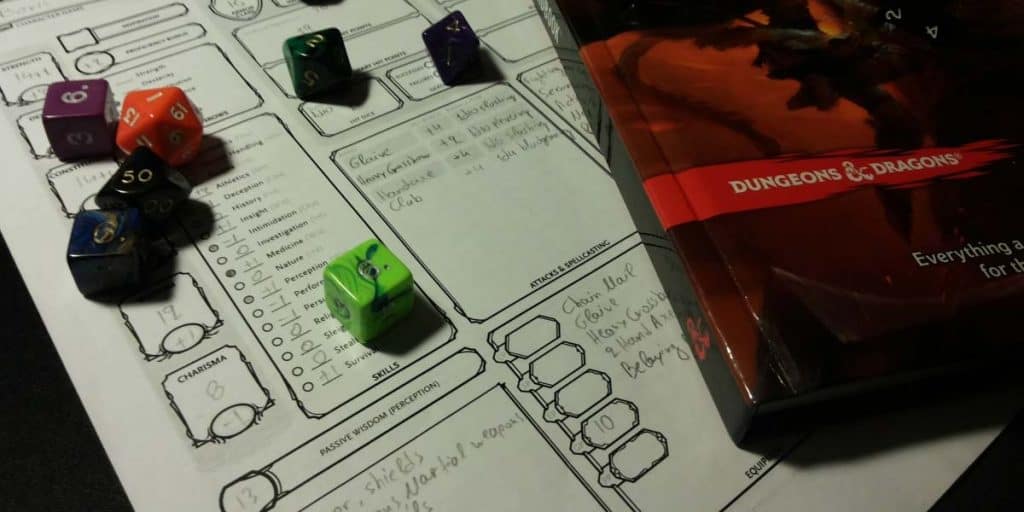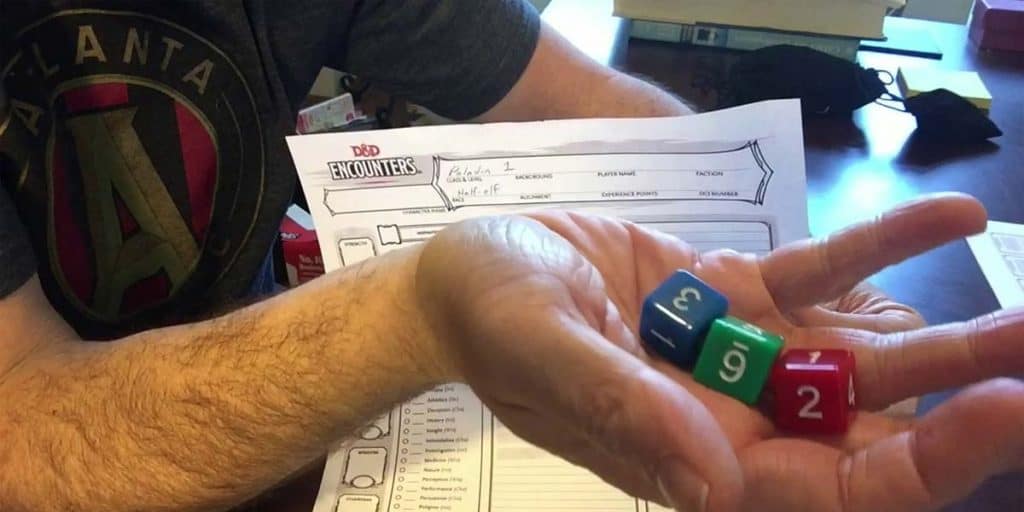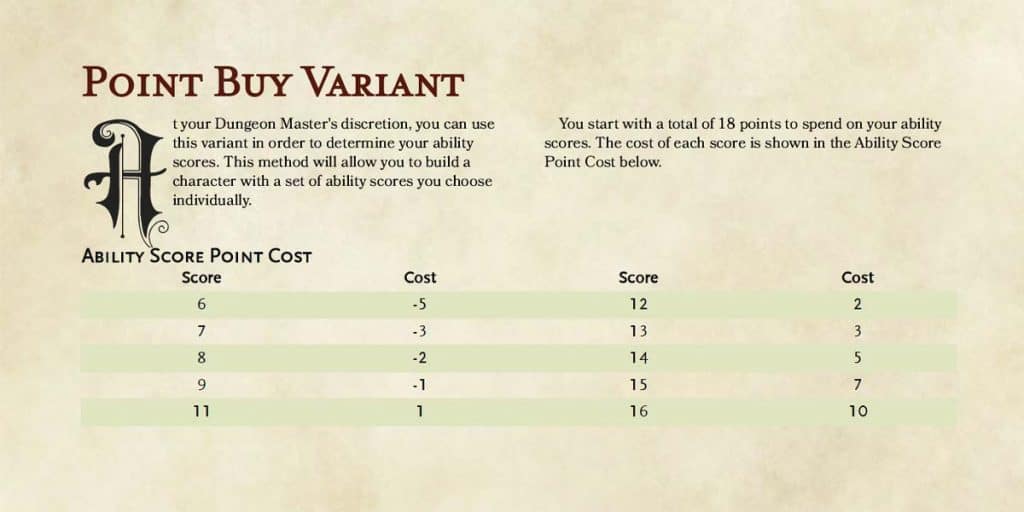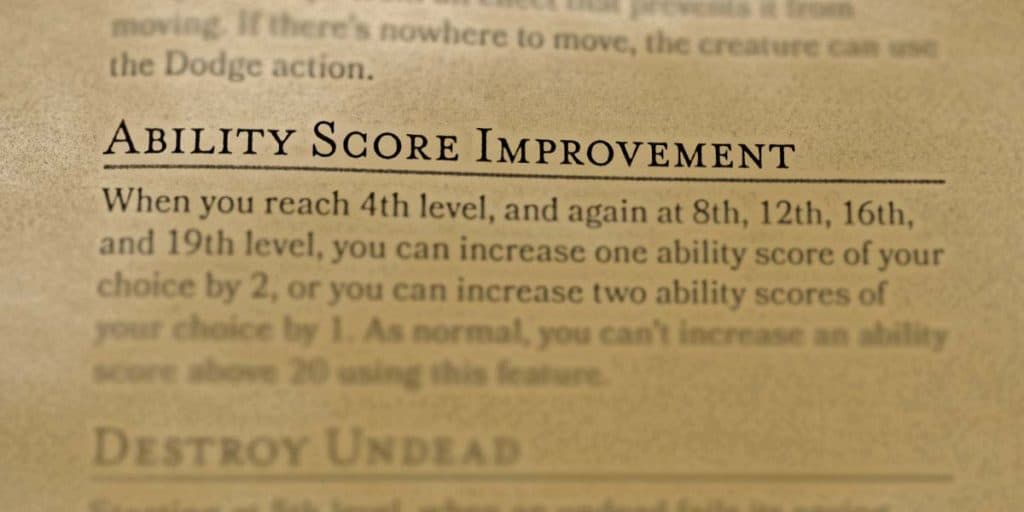Pro Guide To Ability Scores Improvement In D&D 5e

In an age of virtual reality, video games, and smartphones, it was Dungeons and Dragons that got people off their desks and onto the floor playing a tabletop RPG. Unfortunately, there are very few games that can match Dungeons and Dragons when it comes to fantasy.
While the game may have had a terrible Hollywood debut, people worldwide continue to hold DnD in the highest regard. DnD is one of the world’s most popular and successful tabletop RPGs. Since its launch in 1974, the game has become one of the major influences of countless fantasy and sci-fi novels, video games and even made a mark on the Hollywood Film Industry.
Every seasoned player in DnD was once a beginner. And getting started with DnD can be burdensome and highly overwhelming, courtesy of the multiple new terms and spells to familiarise yourself with. The game contains a lot of new terms and numbers for one to come to terms with.
Right from the knowledge of which spells to choose to cast them, there is a lot to know about DnD before starting out. So before starting Dnd 5e, you need to familiarise yourself with a lot of things. Right from creating your character to upgrading their ability skill, you need to know it all.
Another important term in the game is Ability Score. The majority of the players do not know what Ability Scores are. If you, too, are plagued by the same question, then this article is for you. In this article, we will be laying down the complete guide to Ability Scores in DnD 5e.
What Are Ability Scores In DnD?
In simple words, ability scores refer to your character’s primary statistics to determine how skilled they are at doing something. These stats comprise your character’s strength, constitution, intelligence, wisdom, charisma, and dexterity. Each of these stats has an ability score that defines the overall magnitude of that ability (stats). In addition, these ability scores also encompass a character’s training and competence in activities related to that particular stat/activity.
These ability scores are determined by rolling, standard array, or via point buy, depending on what your Dungeon Master has decided for the game. Once the score is fixated upon, you will then apply the bonus points granted by your race.
For example, if you are an elf, you get a +2 bonus to your Dexterity and a +1 bonus point to another score fixated by your subrace.
These ability scores are found on the left-hand side of your character sheet. The higher the number in the box, the better is your character at that ability. The typical range lies between 8-15 before racial modifiers are applied. There are a total of 6 attributes in DnD that refer to the physical and mental abilities of a character, monster, or NPC. These are
- Strength (Str)
- Dexterity (Dex)
- Constitution (Con)
- Intelligence (Int)
- Wisdom (Wis)
- Charisma (Cha)
How Do Ability Scores Work In DnD 5e?
An ability score is determined by discarding the lowest score after rolling 4d6. This drill is repeated six times, and the score obtained during each roll is placed next to the player’s ability. Meanwhile, your ability score determines your ability score modifier, which can then be used for your skills, attacks, and so on. At every EVEN ability score, your ability score modifier increases by +1.
Here are the ability score modifiers
| Score | Modifier |
| 1 | -5 |
| 2-3 | -4 |
| 4-5 | -3 |
| 6-7 | -2 |
| 8-9 | -1 |
| 10-11 | 0 |
| 12-13 | +1 |
| 14-15 | +2 |
| 16-17 | +3 |
| 18-19 | +4 |
| 20-21 | +5 |
| 22-23 | +6 |
| 24-25 | +7 |
| 26-27 | +8 |
| 28-29 | +9 |
| 30 | +10 |
What Are Ability Checks In DnD 5e?
Ability Checks is a test that determines a character/monster’s talent and training to overcome a challenge. Ability Checks are rolls done to check your Ability Score. The Game Master (GM) requests for an ability check every time your character/monster attempts a challenge/task that has a chance of failure. To do an ability check yourself, roll a d20, add the relevant ability modifier, and compare the total value you get with Difficulty Class (DC). If the total you receive matches the DC, then your ability check is a success. If the total is a success, then your character overcomes the challenge it has undertaken. If the outcome is uncertain, then the dice are rolled.
For every ability check, the GM holds power to decide which of the six abilities is relevant to the task and the difficulty as per the DC. The typical DC are as follows.
| Task Difficulty | DC |
| Very Easy | 5 |
| Easy | 10 |
| Medium | 15 |
| Hard | 20 |
| Very Hard | 25 |
| Nearly Impossible | Hard |
If the ability check is a success, then your character/monster will complete the task at hand with ease. If the check fails, then your character/monster makes NO progress towards the objective and is marked as a setback by the GM.
Types Of Ability Scores In 5e

There are a total of 6 attributes/ability scores in DnD that refer to the physical and mental abilities of a character, monster, or NPC. These are
- Strength (Str)
- Dexterity (Dex)
- Constitution (Con)
- Intelligence (Int)
- Wisdom (Wis)
- Charisma (Cha)
Each ability score represents the skills your character/monster is proficient in. Thus, a skill represents an aspect of the ability score. Meanwhile, your character’s proficiency in that skill showcases the focus on that particular aspect. Every character’s proficiencies are determined at the time of character creation. Similarly, a monster’s skill proficiency appears in the stat block.
Each ability score is used for different reasons and helps you roleplay your character. Here are the six different scores explained in detail
1. Strength (Str)
It refers to the overall physical capability of your chosen character. A higher Str score means your character is strong. Your character can then use this ability score to melee and thrown weapon attacks and inflict damage.
The GM can request for strength check at any of the given instances.
- Attacking with a longsword
- Lifting a heavy boulder
- Kicking open a door
- Carrying a soldier
- Throwing a javelin/spear at a particular target
2. Dexterity (Dex)
While strength refers to the strongness of your character, Dexterity refers to the overall quickness and agility of your chosen player character. This particular ability score can have an impact on a few aspects of your character. The Dexterity stats affect your initiative modifier, armor class, specific skill rolls, and ranged/finesse weapon attacks. More dexterity means your character is more agile, which means they react quicker when in combat.
The Dex ability score is generally used when
- Attacking with a longbow
- Increase your armor class for light/medium armor
- Rolling it a short drop
- Sneaking past a guard
- Pickpocketing a drunk
3. Constitution (Con)
This passive ability in DnD 5e determines how complex your chosen character is. The most significant impact this ability has is determining the number of hitpoints you have in DnD 5e. Spellcasters generally use this score to make concentration-saving throws for particular spell effects. You use Constitution when
- Adding a constitution modifier to increase your hit point at level up
- Making a saving throw against an ingested poison
- Rolling a concentration save to maintain a spell’s effect
4. Intelligence (Int)
As the name suggests, this ability score determines how smart your chosen character is in DnD 5e. This ability score covers a few perks and skills, such as
- Arcana
- History
- Investigation
- Nature
- Religion
Each of the perks, as mentioned above, uses intelligence to understand as a form of education. This ability score is used mainly by Artificers, wizards, Eldritch Knight Fighters, and Arcane Trickster Rogues as their primary spellcasting ability. Some instances of utilizing the Intelligence ability score are
- Understanding the enchantment on a door
- Recalling the history that took place at an ancient battle site
- Deciphering a code
- Figuring out the poisonous plants
- Making spell attacks as a Wizard
5. Wisdom (Wis)
Wisdom ability refers to your character’s ability to read and understand the world around them. This nuance ability score generally means your chosen character’s overall perceptiveness, willpower, and how your character stands against forces that affect their mind and influence their intuition. This skill is primarily dependent on how well your character perceives the surrounding. This includes small yet effective perceptions such as smelling a leak, eavesdropping on a nearby patrol, and many other situations that call for a Wisdom check.
Some instances wherein you use the Wisdom ability check include
- Eavesdropping on a nearby or passing patrol
- Reading a shady NPC to find out whether they can be trusted
- Resisting a fear effect
- Finding food for the party in the wilderness
6. Charisma (Cha)
Charisma in DnD 5e is your character’s overall personality and how they interact with other people in the game. A high charisma ultimately means your character can talk his way through anything. This ability score affects a few skills, such as
- Deception
- Intimidation
- Performance
- Persuasion
You will need to have a certain amount of charisma to execute each skill mentioned above. This includes your ability to lie, subjugate, entertain, or placate. Talking to an NPC will have you performing this ability score. Some instances wherein you use the Charisma ability score are as follows.
- Talking to an NPC
- Lying to the guard about the bar fight
- Intimidating a bandit for gaining information about their boss
- Playing the instrument for the crowd in Town Square
- Smooth-talking your way into a gambling game
How To Determine Ability Scores In DnD 5e?

Once you get to know what ability scores mean and how they work, it is time you get to know they are calculated. The ability score is generally located to the left of your character sheet, and you must understand how these ability scores are determined. There are three methods to calculate ability scores in DnD 5e, namely.
- Standard Array
- Rolling For Stats
- Point Buy System
Each of these three methods has its own set of advantages and disadvantages. However, none of them are objectively better than each other and generally depends on your table preference.
Here is how these three calculating methods work
1. Standard Array System For Ability Scores
This is one of the most standardized methods used for calculating Ability Scores in DnD 5e at the time of character creation. This method relies on an array of stats that players allocate on their character sheet.
The Standard Array for calculating ability scores in DnD 5e are
- 15
- 14
- 13
- 12
- 10
- 8
At the time of character creation, you will assign any one of these scores (arrays) to each of your Ability Score. This is one of the highly recommended methods for calculating arrays since it drastically reduces the hassle of rolling for ability scores and gives your character an even, round set of stats.
2. Rolling For Stats Method
This method is a more traditional one used for calculating Ability Scores in DnD 5e. This is one of the oldest methods to help determine your ability score. The rolls are much more varied in this method, and you can now roll a number higher than 15 that will create more heroic and potent characters. Unfortunately, this method has a certain drawback. Going by the Rolling For Stats method can leave a huge power gap between two characters if either of them rolls a number lesser than the other.
3. How To Roll Ability Scores In DnD 5e?
The methods mentioned above will have you rolling the dice to get the best stats in your character’s corner. While the maximum roll limit in Standard Array System is 15, you can move higher than 15 if you’re using the Rolling for Stats method. There are a variety of ways using which you can move stats in DnD 5e. Similarly, there are a few methods using which you can allocate these rolls to make things a bit more complicated. Here are the few ability scores you can roll in DnD 5e
I. Rolling a 3d6
Rolling a 3 6-sided for each stat is one of the common ways of rolling an ability score. There is no flaw to it and what you roll is what you get. The actual average score you get when rolling a 3d6 is either a ten or an 11. But with a 3d6, you can roll as low as a 3 and as high as an 18. Doing so would result in the character’s good or bad at the primary usability to restart from level 1.
II. Rolling A 4d6 and drop the lowest
One of the popular methods of rolling an ability score is to roll 4 6-sided dice. This is the same as roll a 3d6 but only results in a higher average and more capable player characters. This is how this method works.
If you roll two 5s, a 4 and a 3, you will only add the two 5s and one 4 and get a total of 14.
The average score obtained when rolling a 4d6 is 12.24. This means you can get a significant increase of +2 on your ability score as compared to rolling a 3d6
III. 1d20 (Chaos Method)
If you feel like taking things to the next level, you can roll a single 20-sided dice to up those ability scores. This method includes taking the dice and rolling the dice. However, using this method isn’t recommended when calculating ability scores.
IV. Assigning Stats In Dnd 5e
This method is used to allocate your rolls (Stats) in DnD 5e. Once you roll your dice, you assign each stat (Roll) to that particular ability score. This gives you control over the overall creation of your character and is a popular way of assigning your stats in DnD 5e. To assign these stats, all you need to do is roll six times (once per ability score) and assign your totals according to the character you want to play.
V. Rolling In Order
Using this method helps you assign your character’s stat (rolls) according to their character sheet. Of course, when you roll your die randomly, you don’t have a say regarding where the numbers go. But with this method, with each die you roll, you assign the rolls starting from Strength all the way down to Consitution. This is an excellent method if you’re new to Dungeons and Dragons and want to avoid any confusion whatsoever.
What Is The Point Buy System In DnD 5e?

This method is used to determine a character’s ability score by eliminating the randomness of the dice. In this Point Buy System, you can distribute your scores as per your choice. However, increasing your character’s stats to a higher level will cost you extra points. In simple words, when using the Point Buy System, you calculate your ability stat (score) based on a pool of points you use to buy stat increases.
This system gives you 27 points. All the ability scores start default at 8, and the stat costs are as follows.
- 8: 0 Points
- 9: 1 Point
- 10: 2 Points
- 11: 3 Points
- 12: 4 Points
- 13: 5 Points
- 14: 6 Points
- 15: 7 Points
The Point Buy System gives you more control over your character’s ability score. The major advantage of this system is that it doesn’t go below nine and leave your character with utterly useless stats while simultaneously allowing you to enjoy more freedom than the Standard Array.
How To Improve Ability Scores In DnD 5e?

At times, a roll might leave your character with garbage stats. While this essentially means the end of the line for you, it doesn’t necessarily have to be like that. This is because there are ways using which you can improve your ability scores in DnD 5e.
Every character in the game improves their ability stat in one way or another. The three primary methods via which your character’s ability scores improve are as follows:
1. Racial Stat Bonuses
In this, each race gets a couple of ability score bonuses. Usually, players receive a +2 for one stat and a +1 for another. Earlier, these bonuses were dependent on the race of your chosen character. However, with the release of Tasha’s Cauldron Of Everything, players can now choose to apply these stat bonuses to any ability score they want. These bonuses will be determined at the time of character creation, so you’ll have a clear idea about the ability score to receive a bonus going forward.
2. Ability Score Improvement
This is one of the main ways using which you can improve your ability score. This happens after every 4th class meaning this will be available at 4th, 8th, 12th, 16th, and 19th levels, respectively. This feature will improve your ability score after every 4 levels, wherein you get a chance to improve your character.
For example: If your chosen character has 5 levels in the Fighter class and 3 levels in the Barbarian class, your total character level is 8. However, this means that you will get the Ability Score Improvement in the Fighter Class since it is the only class that has made it past Level 4.
3. +2 in 1 or +1 in 2
In this ability score improvement, your two ability scores increase by 1, or one particular ability class increases by 2. So you can use this ASI to increase one ability score by two or two ability scores by one. It is all up to you. This is one of the easiest ways of using an ASI and buffing up your character’s skills. All it involves is basic addition which will only benefit your character.
4. Feats
Feats in DnD 5e give you the option to increase an ability score along with a particular feature. If your character sports an optional Feats rule, you can choose to either increase an ability score or choose to improve a base stat. Meanwhile, a few feats give you a stat bonus along with a new ability score.
For Example: If you have the Resilient Skill, it gives you a +1 in an Ability Score of your choosing and proficiency in the corresponding saving throw of your selected stat.
Note that NO feat increases your ability score by +2. Therefore, you will have to stick to the traditional ability score improvement to buff your character.
5. Magical Items That Improve Your Ability Score
While there are methods that improve your ability scores, other magical items in DnD 5e can also enhance your ability score. However, this method of enhancing your ability score lies entirely with the Dungeon Master. A few items in the DM’s guide give you a bonus in a particular ability score. Although, there is NO guarantee that you will get any magical items in DnD 5e and the DM holds power to decide whether to give you those magical items or not.
For Example, Loun Stones increase a single ability score by 2. Similarly, Gauntlets Of Ogre Power will increase your strength to 19.
6. Training Ability Scores In DnD 5e
If you have little luck with rolls and magical items in DnD 5e, you also have the option to train your ability scores in DnD 5e. However, this method is only applicable if your DM allows it. Refer to page 131 on the DM’s guide to look at the rules to train and gain additional ability scores.
Then, refer to page 231 to check the special training as a reward instead of physical competition. However, ensure that you check with your DM first, as the DM holds power to grant you magical items and the permission to train your ability scores in DnD 5e.
Also Read:
The Bottom Line
We hope our article was able to successfully able to walk you through everything there is to Dungeons and Dragons. There is more to this tabletop RPG than what meets the eye. Getting started with DnD can be tough and highly overwhelming, courtesy of the multiple new terms and spells to familiarise yourself with.
The game contains a lot of new terms and numbers for one to come to terms with. Right from the knowledge of which spells to choose to cast them, there is a lot of to know about DnD before starting out. You’ll need to get your head around certain aspects of Dungeons & Dragons 5E character creation, regardless of what race and class you decide to play as.
Note that ability scores are important as they inform you of everything your character is capable of. From attack roles to ability checks, you can score from each to improve your ability score.






